Have you ever wondered, “Why do rabbits dig in their litter box?” Understanding the fascinating reasons behind this behavior can help you create a happier, more comfortable environment for your furry friend. Let’s explore the instincts and habits that drive this digging frenzy and discover effective strategies to reduce litter box digging.
Key Takeaways
Digging is a natural behavior for rabbits, providing them with appropriate nesting areas and environmental enrichment can help curb this.
The cleanliness of the litter box and the type of litter used are important factors in reducing digging behavior.
Strategies such as alternative digging opportunities, regular maintenance, and consulting a veterinarian or animal behaviorist should be implemented to reduce persistent issues.
Understanding Rabbit Digging Behavior
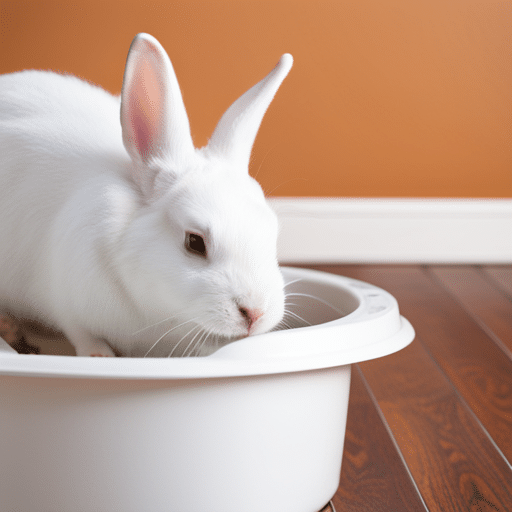
The act of digging in their litter box helps rabbits meet a variety of physical and emotional needs, including instinctual tendencies, nesting urges, and stress relief. What may appear as strange behaviors are in fact quite natural for rabbits, mirroring the digging activities of their wild counterparts. Domestic rabbits dig for fun. Wild rabbits, however, must dig to survive. Regardless of the reason, digging can provide mental stimulation that benefits their overall well-being.
Yet, as rabbit owners, it is our responsibility to mitigate potential home damage and provide proper outlets for this inherent behavior.
Instinctive Origins
Rabbits possess a natural tendency to dig, inherited from their wild ancestors who were accustomed to burrowing. This ingrained behavior is understandable, given that burrowing offered wild rabbits shelter and a means to evade predators. Although domestic rabbits no longer need to dig for survival, the instinct remains strong, which is why providing an appropriate outlet for this digging energy is important.
Besides instinct, your rabbit’s digging behavior can also be influenced by the type of flooring in your house. Carpeted floors are more susceptible to being destroyed by rabbits, while hardwood or tiled floors are more difficult to dig through. Providing fresh litter in their litter box can help reduce the chances of them digging in inappropriate places.
Nesting Habits
Female rabbits, in particular, may dig more persistently due to their natural tendency to create nests for their offspring. Wild rabbits are known to establish nests in heaps of brush, margins of fields, and lawns that provide adequate cover. These nests are often well-concealed and can be discovered near bushes, trees, and tall grass. Rabbit nests are usually shallow depressions in the ground, lined with fur taken from the mother rabbit’s belly and covered with dried materials. Designating a specific area for nesting could help curtail litter box digging among female rabbits.
One should remember that while male rabbits generally do not participate in nest building, they still retain the natural instinct to dig. Ensuring that there are appropriate outlets for this natural behavior is crucial for both male and female rabbits.
Stress Relief and Boredom
Digging can serve as a coping mechanism for rabbits experiencing stress or boredom, providing them with a way to relieve frustration and find comfort. A recent study by Italian researchers revealed that almost 30% of 184 rabbits displayed repetitive behaviors. Actions such as repeatedly changing the content of their litter box were observed, suggesting they were using it as a means to deal with feelings of boredom. Providing appropriate environmental enrichment and alternative digging opportunities, such as bunny digging, can help reduce this behavior.
If your rabbit is excessively digging in its litter box, it may be indicative of discomfort, stress, or dissatisfaction with its living environment. Ensuring that your rabbit has proper enrichment activities and social interaction can help alleviate stress and boredom, reducing the likelihood of litter box digging.
Factors Contributing to Litter Box Digging
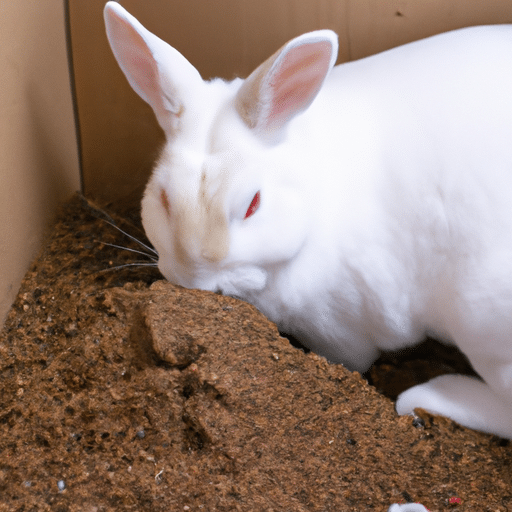
Several factors contribute to a rabbit’s digging behavior in their litter box, including the type and cleanliness of the litter, environmental changes, and a lack of stimulation.
Tackling these factors specifically can assist in reducing litter box digging, creating a more peaceful environment for both you and your rabbit.
Litter Type and Cleanliness
The type of litter used and its cleanliness can impact a rabbit’s digging behavior. Rabbits typically prefer litter options such as:
aspen shavings
wood pellets
shredded paper
soft paper-based bedding material
It is important to remember that cedar or pine shavings should not be used as litter for rabbits due to potential health risks. Adding hay into the litter box can prove tempting for the rabbit, allowing them to munch on a snack while attending to their needs and thus deterring them from digging elsewhere in the house.
A dirty litter box may increase the likelihood of digging behavior in rabbits due to the potential for boredom and the need for stimulation. Regularly cleaning the litter box and replacing it with fresh litter can help minimize digging behavior and maintain a sanitary environment for your rabbit.
Environmental Changes
Changes in a rabbit’s environment, such as the introduction of a new pet, relocation to a new home, or an alteration in routine, can cause stress in rabbits, which may result in litter box digging. Relocating the litter box or introducing new objects into the environment can be potential sources of stress. Providing a stable and consistent environment for your rabbit can help reduce stress and minimize digging behavior.
It is also important to consider the location of the litter box and ensure that it is away from areas where your rabbit may be exposed to loud noises or other stressors. A quiet, secure location for the litter box can help your rabbit feel more at ease and reduce the likelihood of digging behavior.
Lack of Stimulation
A lack of mental and physical stimulation can result in boredom, which may cause rabbits to dig in their litter box as a form of entertainment. To address a lack of stimulation, we suggest providing alternative digging opportunities, enhancing environmental enrichment with rabbit toys, and performing regular litter box maintenance.
Providing your rabbit with ample opportunities for exercise and mental stimulation can help alleviate boredom and reduce the likelihood of litter box digging.
Strategies to Reduce Litter Box Digging
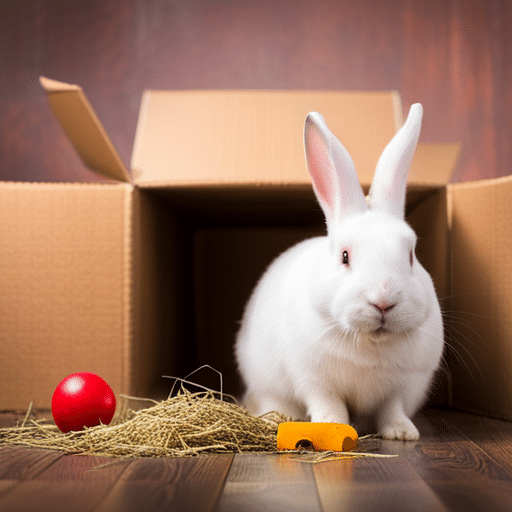
To curtail litter box digging, one must tackle the root causes contributing to this behavior. By providing alternative digging opportunities, enhancing environmental enrichment, and maintaining a clean litter box, you can create a more comfortable and enjoyable home for your rabbit.
Providing Alternative Digging Opportunities
Providing specific digging areas, like digging boxes or outdoor runs, can aid in redirecting a rabbit’s digging behavior away from the litter box. Constructing a DIY digging box for rabbits can be achieved using a large cardboard box or plastic tub filled with:
shredded paper
plastic ball pit balls
plain soil
other rabbit-safe materials
An outdoor run can provide a rabbit with ample space and the opportunity to engage in their preferred digging activity. Providing your rabbit with appropriate outlets for their natural digging instincts can help reduce messes and prevent damage to your home.
Enhancing Environmental Enrichment
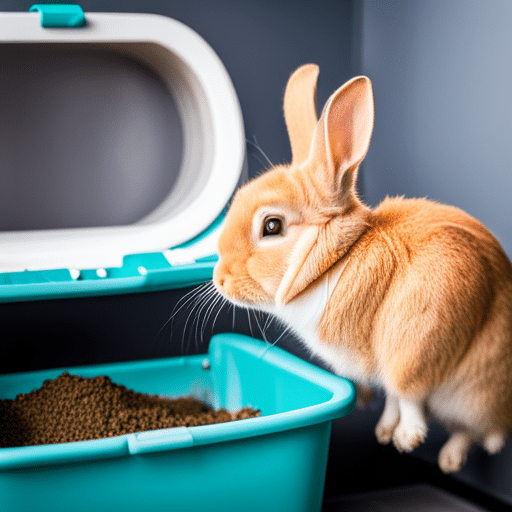
Furnishing toys, facilitating social interaction, and creating an engaging environment can help counteract boredom and lessen the chances of litter box digging. Environmental enrichment for rabbits includes:
Providing toys, such as balls or tunnels, for them to play with
Offering social interaction with other rabbits or even other species
Creating a stimulating environment with plenty of hiding places, chewable objects, and other items that encourage natural behaviors
Ensuring that your rabbit has access to a variety of enrichment activities can help keep them mentally and physically stimulated, reducing the need for them to dig in their litter box.
Regular Litter Box Maintenance
Regularly cleaning the litter box and ensuring it is an appropriate size and shape for your rabbit can help minimize digging behavior. The frequency of cleaning a rabbit’s litter box can vary depending on the type of litter used and the number of rabbits, but it should be done routinely for optimal cleanliness. Spot cleaning should be done daily, and a full change of litter should be done every two to three days.
Keeping a clean and suitably sized covered litter box can make your rabbit feel more at ease and lower the chances of digging behavior. It’s essential to choose the right type of litter, such as cat litter, to ensure maximum comfort for your pet. You may also consider trying a different litter box to see if it better suits your rabbit’s needs.
Addressing Persistent Litter Box Digging Issues
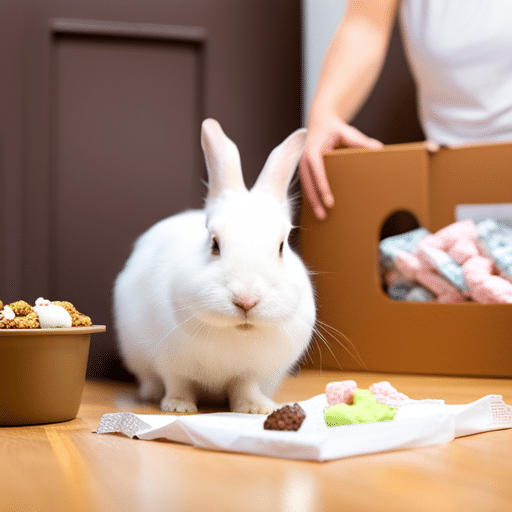
If litter box digging persists despite implementing these strategies, it may be necessary to monitor for health concerns, try behavioral modification techniques, or consult with a veterinarian or animal behaviorist. Persistent digging could be a sign of an underlying health issue or dissatisfaction with the rabbit’s environment.
Monitoring for Health Concerns
Keep an eye on your rabbit’s overall health and behavior, as persistent digging could be a sign of an underlying health issue. Should you observe a noticeable shift in your rabbit’s digging behavior coupled with other illness symptoms like:
lethargy
appetite loss
breathing changes
withdrawal
Seeking veterinary care becomes essential, especially when visiting a pet store.
Addressing any health issues on time can help improve your rabbit’s overall well-being and reduce the likelihood of persistent digging behavior.
Behavioral Modification Techniques
Attempting behavioral modification techniques, such as positive reinforcement or redirection, may help reduce litter box digging. If you notice your rabbit beginning to start digging in their litter box, gently redirect them to an appropriate digging area or provide a reward when they use the litter box correctly.
Consistent use of these techniques can help prevent litter box digging, reinforcing positive behaviors and reducing the likelihood of this issue.
Consulting with a Veterinarian or Animal Behaviorist
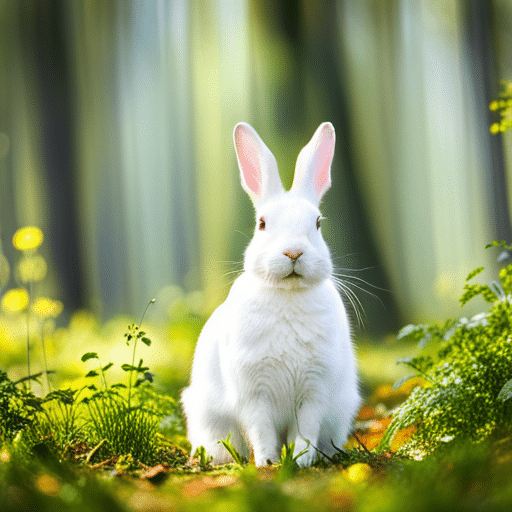
Should all else prove ineffective, a consultation with a veterinarian or animal behaviorist can offer expert advice on tackling your rabbit’s litter box digging behavior. They can assess your rabbit’s overall health, and living environment, and provide recommendations for enrichment and appropriate litter box setup.
With professional advice, you can be well-equipped to create a comfortable and enjoyable living space for your pet rabbits.
Summary
In conclusion, understanding the reasons behind your rabbit’s litter box-digging behavior can help you create a more comfortable and harmonious environment for both you and your furry friend. By addressing instinctive origins, nesting habits, stress relief, and boredom, as well as implementing strategies such as providing alternative digging opportunities, enhancing environmental enrichment, and maintaining a clean litter box, you can minimize digging behavior and ensure a happy, healthy home for your rabbit.
Frequently Asked Questions
Why does my rabbit dig in the litter box?
Your rabbit may be digging in her litter box out of boredom as a way to pass the time. If they are kept in a cage that’s too small or don’t have enough enrichment activities, they might resort to digging at the only thing available to them. High-sided litter boxes and hay-filled boxes can help minimize the mess. Trimming their claws could also help curb the behavior.
Why is my rabbit suddenly digging?
It sounds like your rabbit might need more enrichment, companionship, or attention – try leaving the room when they start digging and reward them with food when they follow you.
How do I know if my bunny is happy?
If your bunny is lying down with a relaxed body, jumping into the air with all four paws off the ground, eating well, being inquisitive, and generally calm and quiet, then they are likely happy.
How do I stop my rabbit from emptying the litter tray?
To prevent your rabbit from emptying the litter tray, try covering the litter with a soft cover such as straw or paper shavings. Additionally, make sure the litter box is the right size and clean it daily to ensure that it meets your rabbit’s needs.
Why does my rabbit keep sitting in the litter box?
It’s likely that your rabbit is finding the litter box more comfortable than its other sleeping areas, and has become accustomed to it. You can make it even more comfortable for your rabbit by using a soft paper-type litter such as Carefresh. This behavior is normal and should not be cause for alarm.



